| Article Overview:
What is the family circle of vigilance? Find out! |
 VigilanceVoice VigilanceVoice

www.VigilanceVoice.com
Wednesday--April
30, 2003—Ground Zero Plus 595
___________________________________________________________
The Family Circle Of Vigilance
___________________________________________________________
by
Cliff McKenzie
Editor, New York City Combat Correspondent News
|
GROUND ZER0, NEW YORK, NY--There is one safe place
for a child these troubled days of Terrorism. It's in the center
of the Family Circle of Vigilance.
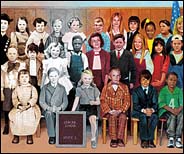 |
|
A century of
advice on raising children |
I was searching this morning for
news to spark a story when I came across a story in the Christian
Science Monitor by Marilyn Gardner with the subtitle: "After 100
years, experts still can't agree on the best way to raise children."
Her story was motivated by a book, "Raising America: Experts, Parents
and a Century of Advice About Children" by Ann Hulbert (Knopf $27.50)
in which the history of conflicting approaches to child rearing are
detailed.

|
The big argument
is that most child rearing experts the public have embraced are men
such as the famous Dr. Benjamin Spock, whose 1946 book, "Baby And
Child Care," launched a thirst for parents to follow third-party
professional child rearing advice. Since then, the camps have
been split into two poles, the soft and hard line of child rearing:
Bottle or breast feeding? Leniency or discipline?
Schedules or spontaneity?
As family experts
marched through the decades, the names changed, ranging from Luther
Emmett Holt and G. Stanley Hall to Arnold Gesell, Bruno Bettelheim, T.
Berry Brazelton, Penelope Leach, and John Rosemond. While the
names have changed, the contrasting points of view about raising a
child with the "soft" or "hard" viewpoint hasn't.
Author Hulbert poses the big question:
"How come so many men advocate systems for raising children?"
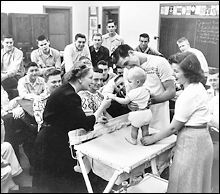 |
|
BRINGING UP BABY:
Early in the 20th century, most child
care was seen as a mother's job. But by the 1950s, classes in
'family life' were being taught to boys in schools.
FROM THE BOOK 'RAISING AMERICA' |
Part of the answer was the woman's role in the home during the first
half of the 20th Century, and only recently, within the past three
decades, has the two parent-working family been a dominant force in
American family culture.
Child rearing has also taken on a
"bastardization" forum in recent years, especially with the Jerry
Springer type television shows where people's "dirty laundry" are cast
to millions of viewers as rifts between mothers and daughters, sons
and mothers, fathers and mothers, brothers and sisters, and are
splayed out in television studios. Headlines of such programming
include: "My daughter dresses like a slut!" And, "My son
is sleeping with my daughter!"
The world of parenting is uncertain at best
for young adults seeking advice on how to raise a child, in part
because of the lack of modeling by parents in the past. Divorce
rates of more than half of all marriages suggest an underpinning of
instability in family units, plus an emphasis on economic survival
tends to drive parenting from issues challenging the child to how to
make the checkbook balance.
Hulbert suggests men who write child
rearing books have little credibility in their own lives to be the
spokesperson for managing healthy children. She
suggests most authors come from families with nurturing mothers and
distant fathers, an imbalance that favors the mother as the main
source of love and affection for the child. Alienation by
default of the father's role is almost always evident.
This brings up the Vigilant Question:
"Who is in charge of raising a child?"
 |
|
Family Circle
of Love |
Historically, the role of child rearing belonged to the "tribe" or the
"village." A child belonged to everyone, and everyone had
a duty to insure the child's safety, security and well-being.
Grandparents, uncles, aunts, cousins as well as parents formed a
Circle Of Love around the child, welcoming and guiding the child
through a varied set of affections and wisdoms. The
child was "part of" the community, a treasured asset of the group
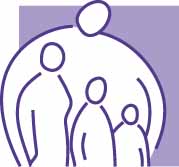 |
|
Family unity
was divided |
As
Americans became more mobile and the thirst to achieve drove them away
from family roots to towns and cities where opportunity called, the
bond between the family unit was broken. Grandparents occasioned
visits on airplanes, and relations with uncles, aunts and other
relatives waned to birthday and Christmas cards. Divorce
ripped the threads of family unity further, dividing the family into
step-parents, step grandparents, step uncles. Dilution watered
down any close bond, and often created huge rifts, walls, and great
opportunity for abuse of children because of the genetic distance
between the child rearing adults and the infant.
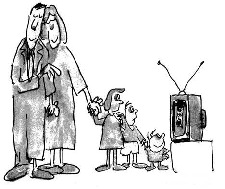 |
|
Television has
ripped parenting from the parents |
Of course, the
great Beast of Terror in child raising can't be denied his
due--Television. Perhaps no single force in modern child
rearing has ripped the duty of parenting from the hands of a mother
and father than Cartoon Network, or the host of children's programs on
the "tube," starting out with TeleBabies to Sesame Street, to Mr.
Rogers, et al.
Many programs for kids seek to
supplant what they don't have in reality. Fred Rogers made
the most earnest attempt, but then he was separated by the television
screen from the child. The ability to hug the child, or
for the child to be hugged, was halted by the reality of a glass
screen. And, then there was Pee Wee Herman, prior to his
exposure as having personal sexual dilemmas. Before his
downfall, he and his bike were "best friends" with millions.
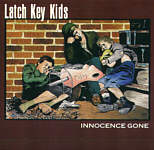 |
'Latchkey kids,' those who went to
empty homes and waited for their parents to come home, were left
abandoned. The idea of family unity could not be
farther from their thoughts, there were no books written of any
acclaim heralding how to raise a child who was instructed to lock the
door and not let anyone in until "mommy" or "daddy" came home.
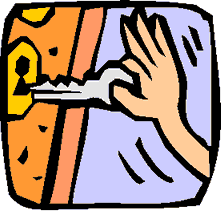 |
It should be no wonder that child
rearing today is confusing, to say the least, considering the ruptures
in family chemistry. Besides the divisions within
family units, cleaved by divorce and drug and alcohol abuse, there is
a societal block that keeps children distant from mentors.
This involves the area of sexual abuse
delivered by members of the church, or by teachers. Walls
of suspicion are built between the child and former authority figures,
forcing the child into a deeper retreat away from rather than closer
to the link to wisdoms that provide all children a safety net to deal
with life and its many challenges.
That's why the Circle of Vigilance is a
vital source for renewing family integrity, and reinforcing the values
of the community.
In raising our children, my wife and I
found that when issues of any size or shape came about, we would sit
in a circle with our children and open discussions on the issue.
As parents, we shed our authority as the "rule
keepers" during the Circle of Vigilance, and all sat on the floor,
legs crossed. Each person would speak on the issue.
Usually, my wife or I would lead off the talk, telling about our
Fears, Intimidations and Complacencies on the issue. To
achieve credibility with our children, we needed to show them our
vulnerability, our concerns that loomed in our minds.
Once the children saw we weren't afraid to
express our concerns, they were more inclined to be honest with us in
their feelings.
The goal of the Circle of Vigilance was honesty.
Sometimes family issues are nothing more than bigotry and prejudices
from one generation to another, usually underscored by a lack of faith
and trust in a child's ability to make decisions.
Our Circle of Vigilance was always launched
with the common rule--that every person must make his or her own
choices in life, and that the duty of the individual was not to follow
the crowd, not to seek acceptance by others as the goal, but rather to
think about what was right and wrong, to think about the results of
any action, and then to make a choice.
 |
|
The family
Circle of Vigilance reminds the child he or she is responsible for
his or her behavior |
"You are in school not to learn," I often
said to my own two daughters, "but to learn to think. If you can
think, if you can make sound decisions you've thought through, and
take full responsibility for them without blaming anyone else, then
you've reached maturity."
We found the age of the children was not a
vital factor in this kind of communication. Even when the
children were small, learning to speak, we spoke to them as though
they understood what we were saying, and brought forth the question in
different forms: "You're job is to learn what is right and
wrong, and to make those decisions."
I suppose the problem I have with
those 'experts' who try and tell others how to raise a child is the
audacity of such an approach. It assumes the child doesn't
know what is right or wrong, and must be taught by people who don't
know how themselves.
In many cases, ala Dr. Spock whose own
family was dysfunctional, experts only appear that way in print, and
often fail miserably on the firing line.
But the Family Circle of Vigilance is not
about telling anyone anything.
The Family Circle of Vigilance is about
reminding the child that he or she is responsible for his or her
behavior, and must answer not to some higher or external authority,
but to himself or herself. When one puts the duty of decision
upon the self, it removes escape routes, and excuses.
This implies, of course, the child has some
moral foundation about what is right and wrong. And, that
foundation is formed by how the child is treated. If a parent
abuses a child, then the child may quickly think it is the moral right
of the "strong" to dominate the "weak."
Herein, lies the rub.
 |
|
The Circle of
Vigilance works if people admit their weaknesses as human beings |
The Circle of Vigilance works only if
the people within it are willing to admit their weakness as human
beings, and to admit their faults. I'm a bellicose
guy, full of opinions, and I often had to check myself and remind my
children I was a mere product of my environment, and what I thought
and believed may not be what they should think and believe.
I reinforced their right and their duty to shape their own opinions,
and to not take anything I said or believed to be any gospel, for it
was nothing more than the sum of my personal experiences, my
inclinations toward, or declinations away from, certain things.
How they chose to believe was their business, and they should take
what they wanted from their mother and father and discard all they
didn't.
Both did.
Our daughters are diametrically
politically opposed, one on the far right, one on the far left, yet
both agree on the other's ability to be different. One
carries a gun and is in law enforcement, and the other is a peace
advocate who carries a cross and opposes all forms of violence.
Yet, they are close as sisters can be.
Finally, there is one other factor
about the Circle of Vigilance I think is critical. My wife and I
agreed to not disagree on parental management issues. We
never had different fundamental ways of raising the children. We
agreed on the fact our children could not come to daddy and get one
story, and mommy for another. We formed a solid parental
wall, one that the children could not circumvent because we agreed to
agree on our policy before they could try and undermine it.
 |
Children are great negotiators, and when they find a weakness, the
will attack it with a passion, especially a difference in opinion
between mommy and daddy. To play into this difference offers the
child a chance to make one parent the "good guy" and the other "the
bad guy."
It seems to me the Beast of Terror
finds his way into the living rooms of America's 100 million
households only when the Family Circle of Vigilance doesn't exist.
If you want to keep the Beast at bay,
form a ring with your family in the living room, all sitting cross
legged, and just start talking about your Fears, your Intimidations
and Complacencies. Watch your children's eyes light up.
They will see you in a different light, as a friend and mentor.
But don't forget. First turn
off the television.
April
29--Saddam's Birth-Death Day Celebrated
©2001
- 2004, VigilanceVoice.com, All rights reserved -
a ((HYYPE))
design

|
|
|